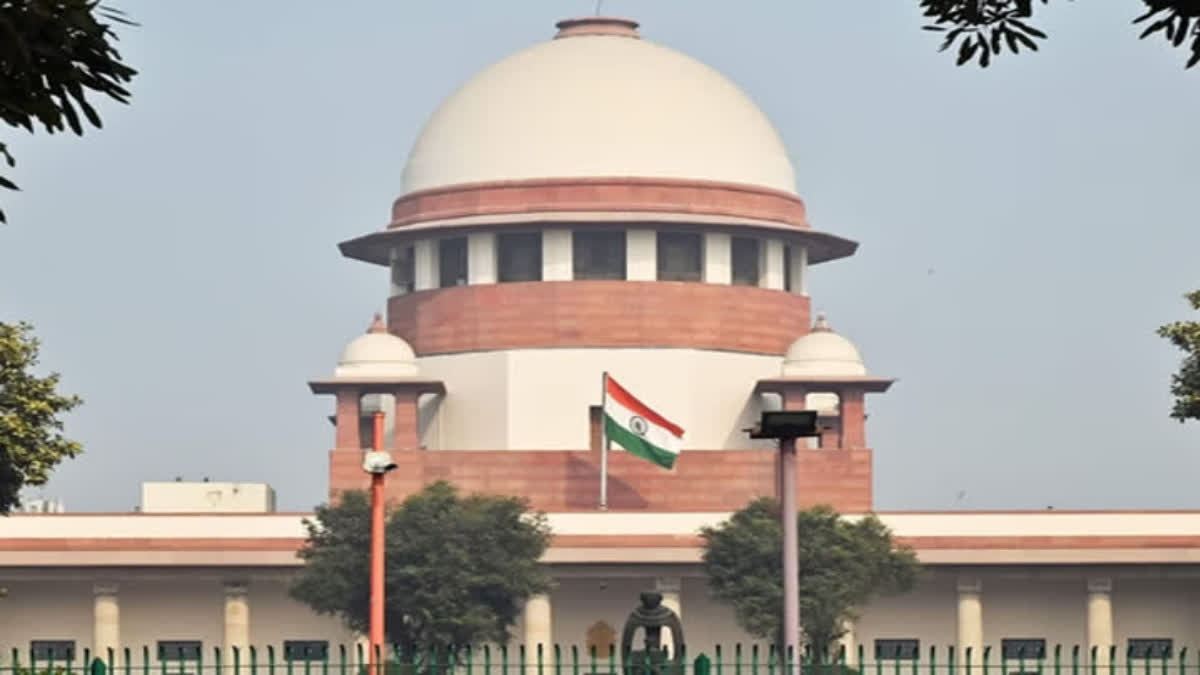New Delhi: The Supreme Court on Monday suggested that the Parliament bring an amendment to the Protection of Children from Sexual Offences (POCSO) Act for substituting the term "child pornography" with "child sexual exploitative and abuse material", and also held that keeping child pornography material on a device would constitute an offence under POCSO Act.
A bench led by Chief Justice of India DY and comprising Justice J B Pardiwala said the replacement of the term "child pornography" with "child sexual exploitative and abuse material", is essential to reflect on the reality of such offences. “We have also requested the Union that in the meantime it may consider issuing an ordinance to bring around this amendment in the definition. Do not use the word child pornography instead say child sexual exploitative and abuse material”, said Justice Pardiwala, pronouncing the judgment on behalf of the bench.
The apex court also directed all courts not to use the term "child pornography" in any of the judicial orders.
Justice Pardiwala the apex court has made various other suggestions. "We have reached the conclusion that the high court committed an egregious error in passing the impugned judgment”, said Justice Pardiwala, setting aside the high court judgment. The apex court restored the criminal proceedings against a man in the trial court, who was acquitted by the high court. The CJI said it is a landmark judgment.
The apex court’s judgment came on a plea against a Madras High Court order, which said that mere downloading and watching child pornography is not an offence under the POCSO Act and the Information Technology law. In January 2024, the Madras High Court quashed the criminal case against a 28-year-old man, S Harish, charged by the prosecution for downloading and watching on his mobile phone some pornographic content involving children. The high court had set free Harish under the Protection of Children from Sexual Offences (POCSO) Act, 2012 and the Information Technology Act, 2000.
The top court made it clear that any visual depiction of a sexually explicit act which any ordinary person of a prudent mind would reasonably believe to prima facie depict a child or appear to involve a child would be deemed as 'child pornography' for the purposes of the POCSO.
"Therefore, for any offence under the POCSO that relates to child pornographic material, such as Section 15, the courts would only be required to form a prima facie subjective satisfaction that the material appears to depict a child from the perspective of any ordinary prudent person," said the bench.
"We further forbid the courts from using the term child pornography and instead the term child sexual exploitative and abuse material (CSEAM) should be used in judicial orders and judgements of all courts across the country”, said the bench.
The bench said Section 15 sub-section (2) of the POCSO would cover both the actual transmission, propagation, display or distribution of any child pornography as-well as the facilitation of it.
"The police as well as the courts while examining any matter involving the storage or possession of any child pornography, finds that a particular sub-section of Section 15 is not attracted, then it must not jump to the conclusion that no offence at all is made out under Section 15 of the POCSO," said the bench.
The top court also suggested implementing comprehensive sex education programs, which should include information about the legal and ethical ramifications of child pornography, and emphasised that it may help deter potential offenders.
"These programmes should address common misconceptions and provide young people with a clear understanding of consent and the impact of exploitation," said Justice Pardiwala, in the 200-page judgment.
Justice Pardiwala said raising awareness about the realities of child sexual exploitative material and its consequences through public campaigns can help reduce its prevalence, and these campaigns should aim to destigmatise reporting and encourage community vigilance.
The apex court stressed that “the Union of India may consider constituting an Expert Committee tasked with devising a comprehensive program or mechanism for health and sex education, as well as raising awareness about the POCSO among children across the country from an early age, for ensuring a robust and well-informed approach to child protection, education, and sexual well-being".
The bench said protection to the social media intermediary under Section 79 of the Information Technology Act would not apply if it fails to expeditiously remove or disable access to that material on that resource without vitiating the evidence in any manner on being notified by the appropriate government or its agency.
The bench pointed out that Section 67B of the IT Act is a comprehensive provision designed to address and penalise the various electronic forms of exploitation and abuse of children online.
"It not only punishes the electronic dissemination of child pornographic material, but also the creation, possession, propagation and consumption of such material as-well as the different types of direct and indirect acts of online sexual denigration and exploitation of the vulnerable age of children," said the bench.
Emphasising that term "child pornography" can lead to a trivialisation of the crime, the apex court said: "The term "child sexual exploitative and abuse material" (CSEAM) rightly places the emphasis on the exploitation and abuse of the child, highlighting the criminal nature of the act and the need for a serious and robust response".
NGO, Just Right for Children Alliance, represented by senior advocate H S Phoolka moved the apex court against the validity of the High Court's judgment and the National Commission for Protection of Child Rights led by senior advocate Swarupma Chaturvedi also intervened in the matter.



